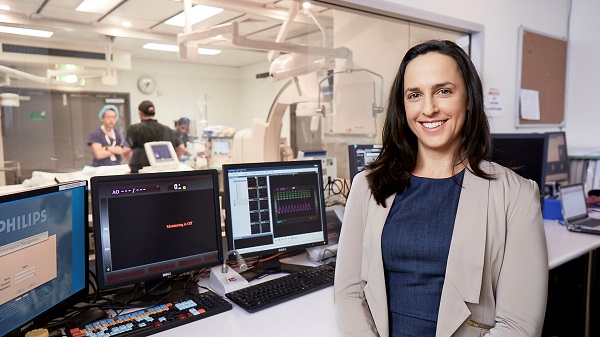It might surprise some to learn that there can be differences in the way a heart attack affects men and women: the pain, the speed of diagnosis and treatment, the response to medication.
The same goes for the experience of heart disease more generally. Differences in male and female biology result in different risk factors, and some cardiac conditions affect many more women than men. Doctors don’t always recognise these gender differences, which can be subtle, and heart disease in women often flies under the radar.
Associate Professor Sarah Zaman is an interventional cardiologist and leading researcher and it’s her focus on the special and previously under-recognised circumstances of heart disease in women, and drive for more effective treatments, that has earned her a NSW Health Cardiovascular Elite Postdoctoral Researcher Grant. The injection of $1 million over three years will help improve outcomes for women with – or at risk of – cardiovascular disease.

The grant brings Zaman to the Westmead Applied Research Centre and to Westmead Hospital as a clinician, and is something of a homecoming. Currently an interventional cardiologist at MonashHeart, part of Monash Health in Melbourne, and an academic-clinician at Monash University, Zaman’s first term as a young medical intern was spent in Westmead Hospital’s busy cardiology department.
“It made such an impact on me,” she recalls. “Patients could get sick very quickly. You felt that you were having a huge impact as a doctor and that shaped the path to my becoming a cardiologist.”
Her PhD, also at Westmead and Sydney University, explored the heartbreaking incidence of sudden cardiac death in patients in the early days after a heart attack. Now, Zaman is involved in the PROTECT-ICD Trial, a multi-centred global clinical trial investigating the benefits of implantable defibrillators for those most at risk.
“Hopefully, the trial will address the knowledge gap and change clinical treatment guidelines around the world for sudden cardiac death prevention early after a heart attack,” she says.
Gender equity matters to Zaman. Her area of expertise puts her in a select group: only 14% of Australian cardiologists are women, with the number specialising in treatments that include inserting stents to restore blood flow to the heart smaller again.
Zaman says there are huge differences in the experience of heart disease between men and women, the result of a complex tangle of bias and biology. Heart disease is under-recognised and under-treated in women, and pregnancy-related risk factors such as pre-eclampsia or gestational diabetes, indicators of higher risk of developing heart disease later in life, are often ignored. Women’s heart attack symptoms can be different to men’s, which can delay treatment. Medication is often under-prescribed or causes side-effects due to gender difference.
“And there’s a bias in the medical profession, where women do have a higher chance of being told its anxiety, or non-cardiac pain, when they present with true heart attack pain,” explains Zaman.
With her new team in NSW, Zaman will be testing exciting innovations in healthcare systems that she hopes will restore urgently needed gender equity when it comes to heart disease. One new study involves assessment of a women’s heart clinic that will screen for and provide early intervention for pregnancy-related cardiovascular risk factors. The clinics will unite cardiologists, dietitians and other specialists with the aim of preventing heart attacks and strokes later in life.
At the Westmead Applied Research Centre, digital health is the key focus. Academic Director Professor Clara Chow is a leading innovator in the field, pioneering the use of personalised text messaging. Zaman hopes to test the use of such digital health platforms in women – medication reminders, for example, or encouraging lifestyle changes – in reducing death rates in patients who’ve had heart attacks.
Zaman and her team will also be working towards a better understanding of the female-dominant condition called spontaneous cardiac aortic dissection, or SCAD. While relatively rare, the bewildering condition, caused when a layer of the heart artery tears and creates a clot that blocks blood flow to the heart, is the most common cause of heart attack in women under 50. A better understanding of SCAD is a high priority for Zaman.
“I’m an academic clinician, so you’re always a clinician first,” she says. “That’s your day-to-day job, treating patients. My research is guided by what is going to benefit a patient directly.”
By Michelle Schlechta
Updated 4 years ago
